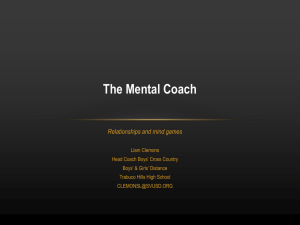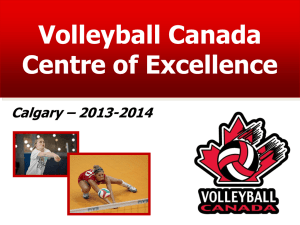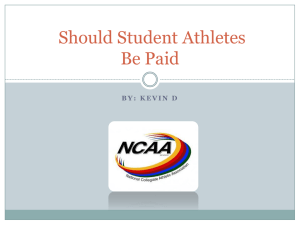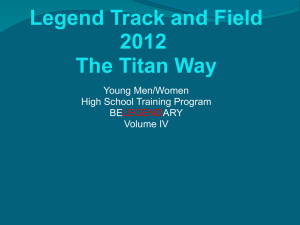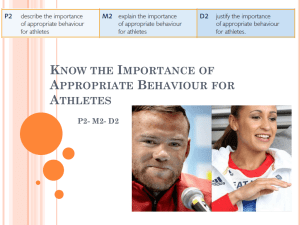Coaching Special Olympics Athletes Study Guide
advertisement
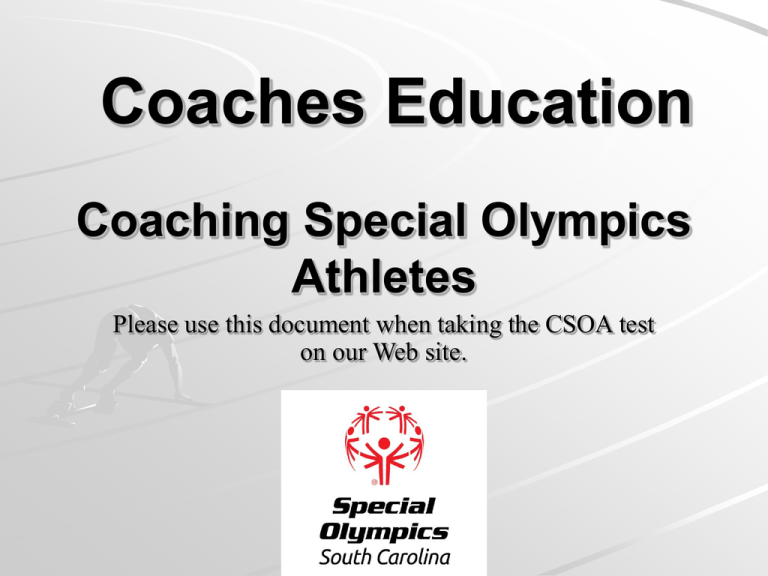
Coaches Education Coaching Special Olympics Athletes Please use this document when taking the CSOA test on our Web site. Mental, physical, and social conditions influence participation Coaches need to be aware of these aspects to understand the athletes better and to design appropriate coaching programs that meet each of the athletes’ needs. Psychological Considerations Motivation - Helping athletes maintain interest May have shorter attention span; harder to keep independently “on task”. May be motivated more by short-term rather than long-term goals. May learn better with more frequent positive reinforcement. Perception - Helping athletes take in information about the sport they are learning May have impairments in sight or hearing. May have difficulty focusing attention on the appropriate object or task. Psychological Considerations Comprehension - Helping athletes understand the sport in which they are participating May find it difficult to understand purely verbal explanations of new skills. Often find it easier to learn through visual demonstrations and physical prompts. May have difficulty in understanding complex, multi-part actions or explanations. Often take a longer time between learning one piece of information and the next (learning plateau). Less able to generalize skills learned in one situation to a different situation. Memory - Helping athletes remember and perform the skills they have learned May need frequent repetition and reminders in order to remember a concept or a skill. Medical Considerations Down Syndrome: athletes with DS are at increased risk for: – certain breathing problems – digestive problems – childhood leukemia – hearing loss – infections – vision disorders Medical Considerations Atlanto-axial instability: orthopedic condition found in approximately 12%-22% of individuals with Down syndrome. There is a misalignment of the 1st and 2nd cervical vertebrae which could cause permanent damage to the spinal cord during hyperflexion or hyperextension of the head and neck. Contraindicated activities: – – – – – – – – Butterfly stroke in aquatics Pentathlon Soccer Equestrian sports Diving Artistic gymnastics Diving starts Alpine skiing Medical Considerations Intellectual Disability Definition: the American Association of Mental Retardation defines a person as intellectually disabled when the following 3 criteria are met: – cognitive level (IQ below 70-75) – significant limitations exist in two or more adaptive skill areas – the condition is present from childhood on (age 18 or less) Social Considerations Typical social skills – May lack social or adaptive skills due to lack of opportunity – Communication and positive interactions with others Physical recreation at home – May not have a physically active home life – May not be encouraged to participate in recreation with family and friends Economic status – May not have the financial means to participate in sports, purchase equipment, etc – May not have access to independent Athlete Behavior Strategies to Improve Learning Learning occurs at a slower rate – – – Provide structure Provide repetition and review Break skills down into smaller parts Short attention span – – – Train for short periods of time Provide repetition & review (key to gaining new skill) Work one-on-one (gain full attention) The Coach The successful Special Olympics coach: Is sports and coaching knowledgeable Is Special Olympics knowledgeable Recruits and trains assistant coaches Provide a safe training and competition program Assist athletes in becoming integrated into the overall community The Coach The successful Special Olympics coach also: Recruits athletes Offers activities for all abilities Puts a priority on safety Conducts high-quality training and competition Training Program To maximize time, it is vital that written plans and programs be developed. They are necessary to chart athlete development and to keep on target There are a variety of levels of instruction and assistance that can be provided to athletes to facilitate learning, skill development, and competition success. Each coach needs to address each athlete individually. Preparation Assessment Review Goal Setting PostSeason Culminating Competition PreSeason Season Plan In-Season Training and Competition Preparation Assessment Conducting a pre-season skills assessment: – Helps to evaluate and measure an athlete’s level of fitness and skills – Helps in making an appropriate selection of a sport or event within a sport – Helps in setting appropriate goals for the season – Helps in tracking progress and measure the effectiveness of training – Provides a valuable record when an athlete moves on to a new coach. Skills Assessment Tests can be found in the Official Special Olympics Sports Rules for team sports Preparation Goal setting Set specific goals for each athlete (variation in levels of fitness and mental and physical abilities) Involve each athlete in individual and team goal-setting Goals need to be readily attainable, shortterm, and easily understood (concrete and specific) Organizing a Special Olympics Training Session There are four components of a typical training session: 1. Warm-up and stretching – – – – Time is precious and skills repetition vital. Warm up in a way specific to the sport. For example, dribble a basketball while jogging as opposed to just running. Where athletes have difficulties with balance, use stretches that can be done while sitting, lying down, or leaning against a wall or partner. Involve athletes in leading the exercises; coaches are then free to circulate to directly assist others who need help. Teach a simple routine that athletes can repeat at home and at competition. Organizing a Special Olympics Training Session 2. Skills instruction – – – – – – – Use drills and activities that involve many athletes at all times. Practice skills in situations that are related to the game or event. Break skills down into small steps. Make sure an athlete is looking at you when making a coaching point. You may have to physically prompt them to look at you. Verbally reinforce the athlete immediately after a desired action. Make the reinforcement specific to skill improvement. Use consistent and descriptive “key words”. For example: “Reach for the sky.” Use appropriate levels of assistance for each athlete verbal, visual (demonstration), physical prompt, physical assistance. Gradually reduce physical assistance in favor of simple cues and eventually no prompting at all. Organizing a Special Olympics Training Session 3. Competition experience – Provide a realistic competition experience during each practice in order to improve confidence and performance under the pressure of real competition. – In team sports help athletes to understand game concepts by providing immediate and concrete feedback. During scrimmages or practice games, stop the play to help athletes recognize critical situations and learn how to react successfully. – Emphasize the value of enforcing the rules during training and underline how this helps prepare athletes for participation in community Organizing a Special Olympics Training Session 4. Cool-down and stretching – Having athletes do light jogging and then stretches of the major muscle groups will prevent cramps and soreness and increase flexibility. – This time is good for recapping the main themes of the training session, rewarding athlete performance, and talking about the next competition or training session. Preparing for Competition Complete all registration information and qualifier paperwork – Athletes must complete and submit the SONC Athlete Participation Form (APF) before the start of the training season – APF must be available on site in case of accident/injury – Coaches should assist with qualifier registration by giving input to their local coordinator Official competition rules – Teach your athletes the rules and, during training, phase out your verbal reminders about rules. At competition, coaches may have little or no opportunity to assist athletes when they are not following the rules. Preparing for Competition Supervision – Discuss the challenges associated with participating in competition away from home, and why adequate, non-coaching support personnel are needed. Transportation Lodging (need for same-sex supervision) Social activities Coaches meetings (who will supervise athletes during these?) Multiple events to supervise, awards ceremonies, etc. – Design a supervision worksheet with the essential elements covered. Preparing for Competition Travel and overnight – Discuss overnight concerns with parents or group-home supervisors. – Write up a simple checklist of items to bring and distribute to athletes and parents (equipment, money, personal items, etc.). – Make sure that all special medication needs are understood. Coaches may have to assist with handling medications. Have all medical forms and information readily available at all times. – Work out the most effective rooming arrangements, taking into account athlete choice, behavioral and personality clashes, Competition-Day Coaching Guidelines for success: Teach responsibility and independence. Assist athletes in: – Dressing appropriately – Understanding what is happening at the competition site – Maintaining a focused attitude and appropriate behavior – Eating correctly and drinking sufficient water Arrive early at the competition site. Allow time for: – Putting on uniforms – Warm-up and stretching routine – Focusing on the competition Competition-Day Coaching Guidelines for success: Coach athletes to put in their maximum effort in preliminary divisioning heats or games. – Applying the “honest-effort” rule from the Special Olympics Rules book – Honest Effort Rule: athlete or team must competed with maximum effort in preliminary and/or divisioning rounds During competition, let athletes compete without direct supervision. – Not running down the side of the track shouting instructions – Allowing the competition officials to conduct the competition – Allowing athletes to make mistakes and helping them learn from their mistakes Competition-Day Coaching Guidelines for success: If you think there is a valid reason to protest the outcome of a competition, do so in a calm manner, following the official guidelines. – Not involving athletes in disputes with competition officials Help athletes deal graciously and realistically with winning and losing (including disqualification). – Focusing on effort made – Recognizing accomplishments and new skills that were performed – Taking something positive away from every experience Putting it all together TRAINING is the key COMPETITION is the means Skill, confidence, courage, and joy are the OUTCOMES Better preparation for life is the GOAL Lifelong skills and increased independence are the RESULTS
